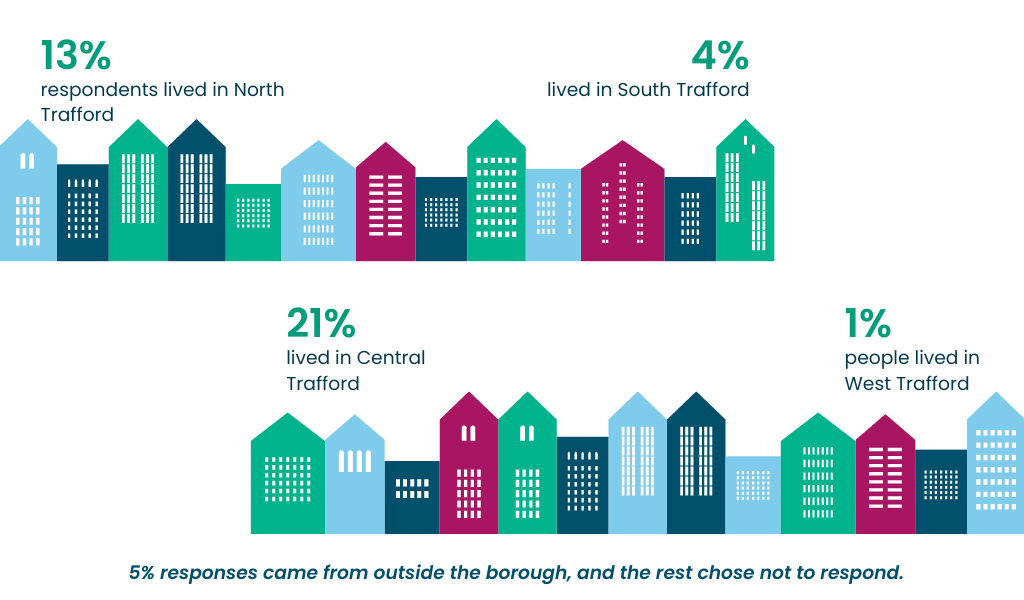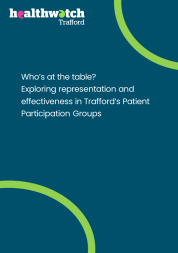Healthwatch 100: Alcohol use in Trafford

Our aim with this project was to gain an understanding around local people’s feelings about alcohol consumption in Trafford. The work was timed to coincide with Dry January, where participants abstain from alcohol for the entire month. Through public survey work, we investigated what people thought about their intake and that of their loved ones, their thoughts around alcohol use, what they knew about finding support, and what they felt might stand in their way. The results provide some useful areas for further research as well as an enlightening snapshot into people’s concerns.
Healthwatch Trafford undertook this project with collaboration from the Public Health Team at Trafford Council; we pass on our warmest thanks and appreciation for their partnership.
What did we do?
Working alongside colleagues in the Trafford Public Health Team, we created and launched a Healthwatch 100 survey in January 2024 which remained live for 3 weeks; survey questions can be found in the appendix. It was sent to our subscriber list and promoted on our website and social media pages. We also visited local groups, events, and attended meetings with local partners during this time. The Public Health Team shared the survey externally and via their internal intranet.
Key findings
- When considering personal alcohol use, use in public, and use within social groups, respondents were most concerned about alcohol use in public.
- Respondents were most likely to consider accessing a specialist alcohol support service for help addressing their own alcohol use, followed by a GP.
- When advising others where to seek support, respondents were mostly likely to recommend contacting a GP.
- A large proportion of individuals would not feel comfortable discussing a family member or friend’s alcohol use with them.
What we heard
Personal drinking
The vast majority of respondents to this question (90%) were not worried about their own alcohol use. 56% people told us they either don’t drink at all or only drink on occasions.
Support with personal alcohol use
Almost one fifth of respondents told us they would not know where to go if they needed help with their alcohol use. This is key, particularly given that Public Health England estimate that 76.2% of those who are alcohol dependant in Trafford are not receiving treatment. Encouragingly, however, even without naming the available options almost one third of respondents suggested they would seek support via either Achieve or their GP.
We provided respondents with a list of options to find out whether they would consider accessing them, or had accessed them previously. It is positive to see the most popular source of support was the specialist alcohol service, with 90% of respondents selecting this option. Achieve provide access to a variety of recovery functions depending on individual needs. Concerning Achieve specifically, one person commented:
‘I'd prefer the Achieve support rather than the "sit in a circle " meeting environment’.
82% of respondents would also be likely to speak to their GP, and almost half of respondents suggested they would consider accessing a community group for support. This is a positive finding as there is existing research on the links between drinking at home alone, mental health problems, and becoming alcohol dependent, an issue which heightened during the Covid19 pandemic.
Barriers to accessing support
With regards to barriers that people may have experienced when accessing or considering accessing services, we found that a large proportion of respondents perceived there to be none. However, almost 40% of respondents highlighted concerns with waiting times for appointments as a potential barrier.
Other reasons given were: being unsure who to contact, worry about other people finding out, transport issues, and further problems with time. Specifically, people cited childcare commitments and being unable to get time off work as barriers to accessing support.
One respondent who told us:
“Social care and Local Authority professionals caused barriers - support not accessed as a result.”
Other people's drinking
We asked respondents how concerned they were about other people’s alcohol consumption in three distinct areas, and people were most concerned about alcohol use was in public. However, a high proportion of respondents also expressed concern for others within their household and family, as well as within their social circles.
Given what we know about the extent of people locally who are alcohol dependent but not receiving treatment, this could highlight an issue around individuals not recognising their own alcohol dependency. Furthermore, it is important to equip family and friends with the ability to support alcohol dependents; Drinkaware found numerous ways in which other people’s drinking habits can negatively impact people’s lives to varying extents and in various ways, contributing to social, economic, and health-related problems.
Supporting others to access care
22% of respondents said they would not feel comfortable having a conversation advising friends and family about support for their alcohol use. While there could be various individual reasons for this, Alcohol Change UK found that stigma towards alcoholism can be a barrier to support and recovery for both dependent drinkers and their family and friends, and they call for a more open, less judgemental approach to the topic.
Over half of those who said they would approach the subject did not know where to signpost people for support. When asked to suggest places, people gave slightly different answers to those they selected for themselves. For instance, when advising others, respondents were more likely to suggest speaking to a GP (90.2%) and less likely to suggest accessing a specialist alcohol service (70.6%). This again could be a lack of knowledge or confidence, resulting in advising them to see a GP for a professional assessment.
Who responded to our survey?
Gender:
Most respondents identified as female (47%). 11% identified as male, 1% as non-binary, and the rest chose not to respond.
Age:
- 14% of respondents were aged 66-79.
- 30% were 45-65.
- 12% were 35-44.
- 3% were 18-34.
- The rest chose not to respond.



Recommendations
Knowledge of support
- Improving knowledge plays a vital role in helping individuals identify their own alcohol dependency and gain the confidence to access support to address the issue. In order to break down stigma, people need to be reassured that they can access care and support without shame. It is also important to arm loved ones with information about what help is out there, which may in turn mitigate the impact of a person’s alcohol dependency on them.
Barriers to support
- People highlighted concerns around waiting times for treatment, an issue that occurs across health and social care services. As per other services, giving people an idea of wait times and what to do during this period may benefit them. Additionally, it would be useful to consider how to help people access care while contending with childcare and problems leaving work for appointments.
More research on the issue of drinking in public
- Of the three areas we suggested, the highest number of respondents expressed a concern with people drinking in public. It may be beneficial to explore this further to examine any possible trends in terms of localities where this is an issue and how the issue may present itself (e.g. anti-social behaviour).
Signposting and support
If you are worried that you, or someone close to you, is drinking too much, Drink Aware have an app to check alcohol levels and signpost support.
If you feel you need support around your alcohol consumption, help is available:
- For specialist drug and alcohol treatment or advice contact Achieve Trafford on 0161 358 0991
- If you are under 21, please contact Achieve Young People’s service – Early Break on 0161 723 3880.
If you are concerned about the alcohol use of someone close to you and not sure what to do:
- Drink Aware: Worried about someone else's drinking?
- If the person is a child or under 21, please contact Achieve Young People's service using the information above.
For general advice:
- Drink Aware: Support Services
- NHS guidance around alcohol consumption - Alcohol advice - NHS.
Downloads
Download the full report below. If you require this in an alternative format, please get in touch.

